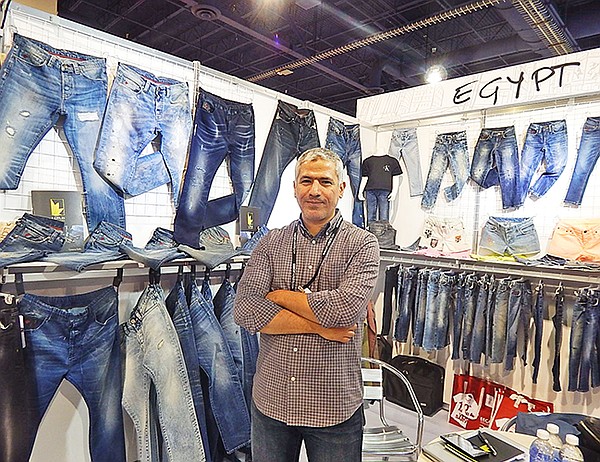TRADE SHOWS | IMPORT/EXPORT
Around the World at Sourcing at MAGIC
The South Hall of the Las Vegas Convention Center turned into the United Nations for the semiannual Sourcing at MAGIC show, which ran Feb. 16–19.
There were more than 40 countries represented at the gargantuan show, where companies that manufactured everything from athletic wear to zippers were represented. Chinese exhibitors made up more than half the show.
This season, there was a focus on Egypt and its 25 qualifying industrial zones, where apparel made in the zones get duty-free entry into the United States under a trade-preference program.
One advantage is that input materials such as fabric and trim can come from anywhere, such as China or India, but at least 10.5 percent direct input, such as packaging, zippers or thread, must come from Israel and 24.5 percent direct input must come from Egypt. Duty-free entry can shave off up to 32 percent in tariffs.
Gail Strickler, the assistant U.S. trade representative for textiles and apparel, said in a seminar that this trade-preference program was started in 2005 to promote peace between Israel and Egypt as well as to help the region grow its economy.
“This program offers you the opportunity to contribute to the greater goal of achieving peace and save money at the same time,” she said, noting there is no expiration date for the trade-preference program.
On the exhibit floor, there were 30 Egyptian companies who were exhibiting at the sourcing show—many for the first time.
One of those was the Lotus Garments Co., which makes blue jeans for brand names such as Levi’s, Jessica Simpson, Polo Ralph Lauren and Wrangler.
Mohamed El-Hady, the company’s marketing director, who was surrounded by a wall of hanging blue jeans finished in different washes, said he had met several new companies at the show.
Some were ventures that wanted to expand on their clothing lineup by adding denim. Others were looking to switch their production of blue jeans out of China. “So far it’s been nice,” he said as a few buyers rifled through the jeans produced by the company, established in 1994. Lotus Garments now has 11,000 employees who produce 1.2 million blue jeans a month. Wholesale prices for denim range from $9 to $13.
While there were 30 Egyptian companies present at the sourcing show, there was only one manufacturer from Honduras, Exiid International, whose clothes can be imported into the United States duty free if made from regional yarns under the Dominican Republic–Central American Free Trade Agreement.
Exiid International manufactures crisp woven shirts and sportswear tops in a factory in Comayaguela, Honduras, near the country’s capital of Tegucigalpa. The company is relatively new, started four years ago by Mark Zacapa, who used to work as an architect.
“We’ve had amazing response,” Zacapa said, standing near the front of his booth, which featured an array of colorful woven shirts. “We’ve had some very good leads, and we are hoping those will be fruitful.”
He had seen buyers from mostly the United States but also company representatives from South America and Mexico. Before coming to the show, he thought most of the buyers would be from small ventures but was pleased there were also people from medium-sized companies.
Also appearing at the sourcing show for the first time was Prasid Pashmina Industry, which came with 10 other Nepalese apparel and accessories manufacturers. But the group wasn’t seeing much traffic in their part of the show. “This first experience has not been that good,” said Ajay Karki, executive chairman and managing director of Prasid Pashmina Industry.
Most of the cashmere shawls, scarves, sweaters and ponchos, gloves and socks the company makes with the help of 60 employees in Kathmandu are exported to Europe, but Karki was looking for more U.S. clients. He thought his small minimums of 50 pieces for woven garments and 25 pieces for knit garments would be a draw.






















